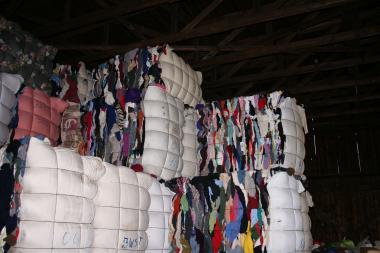Zentrales Thema für EPR: Eigentum an den Textilien
Die Eigentumsfrage, die sich bereits wie ein roter Faden durch die Verpackungsgesetzgebung zieht, wird auch im Zusammenhang mit der geplanten Errichtung eines EPR-Systems für Textilien höchste Priorität für die Branche haben, hob bvse-Hauptgeschäftsführer Eric Rehbock vor rund 100 Teilnehmer:innen auf dem 11. Internationalen Alttextiltag in Dresden hervor.
„Die Einführung eines geeigneten EPR-Systems ist ein äußerst komplexes Thema, das der bvse mit seinem Fachverband Textilrecycling und über seinen europäischen Branchendachverband EuRIC nach Kräften begleiten wird. Es dürfen sich auf keinen Fall die Fehler wiederholen, die bereits in der Vergangenheit begangen wurden“, so Rehbock.
Ein zentrales Kriterium sei die Festlegung des Eigentums an den Textilien, machte Rehbock deutlich. Das Interesse, gute und nachhaltige Qualität zu generieren, sei entscheidend damit gekoppelt, dass die Unternehmen eigene Verantwortung tragen und den Output selber vermarkten können. Dies habe man ganz klar aus den Erfahrungen mit dem Verpackungsbereich lernen können: „Wenn nur nach Tonnage bezahlt wird, ist die Qualität, die hinten herauskommt, egal“, so der Verbandschef.
In Deutschland wurden bereits über Jahre gut funktionierende Strukturen in der textilen Sammlung, Sortierung und Verwertung aufgebaut.
„Wir haben in Deutschland ein Sammel- und Verwertungssystem für Alttextilien, das in Europa seinesgleichen sucht. Im Hinblick auf die EU-weite Diskussion um die verpflichtende Getrenntsammlung von Textilien ab Januar 2025 können wir sagen: In Deutschland ist bereits alles da!
An dem bestehenden Gemeinwerk von gewerblichen, caritativen und kommunalen Sammlern, Sortierern und Verwertern muss auch nichts verändert werden", hob der bvse-Vizepräsident und Vorsitzende des Fachverbandes Textilrecycling, Stefan Voigt, hervor.
„Allerdings kommen wir nicht mehr umhin, ein EPR-System zu errichten, dass der Branche Unterstützung bei der Gewinnung von Finanzmitteln für die Aufrechterhaltung ihres bewährten Systems leistet“, machte Voigt deutlich, denn diese habe mittlerweile ein immer größer werdendes Finanzproblem:
„Unsere Branche verrichtet eine Dienstleistung an der Bevölkerung und muss, im Gegensatz zu anderen Stoffströmen, dafür bezahlen – und das sofort oder sogar vorab. Die Finanzmittel für die Aufrechterhaltung des Systems durch den Verkauf der Alttextilien erhalten die Unternehmen der Alttextilbranche oft jedoch Monate, im Exportgeschäft sogar teilweise erst ein ganzes Jahr später“, so Voigt. „Die Alttextilbranche benötigt dringend ein EPR-System, das frische Gelder in das System bringt und deren Wirken im Sinne der Kreislaufwirtschaft unterstützt."
Bei der Implementierung eines geeigneten Systems ginge es allerdings nicht ohne eine Organisation, in der alle Daten zusammenfließen, hob Hauptgeschäftsführer Eric Rehbock hervor. Nur so könne man das Problem mit nicht registrierten Trittbrettfahrern vermeiden, die Produkte auf den Markt werfen, ohne sich an der Finanzierung für Sammlung, Sortierung und Recycling zu beteiligen. „Der bvse wird weiterhin alles dafür tun, den Textilmarkt zu erhalten und dafür zu sorgen, dass unsere privatwirtschaftlichen Unternehmen weiterhin in der Wertschöpfungskette vertreten sein werden“, betonte Rehbock.
EPR-Umsetzung: Alttextilmarkt wird komplexer – Umsetzungsaufwand steigt
Auf die Frage, wie die operative Umsetzung eines EPR-Systems aussehen könnte, ging André Rückert vom Unternehmen ECOLOGICON ein, das sich auf die Beratung für Unternehmen der Kreislauf- und Abfallwirtschaft spezialisiert hat. „Die Regierung und der Gesetzgeber müssen die bestehende Struktur miteinbeziehen, um auch Arbeitsplätze und Geschäftsmodelle zu schützen“, bestätigte Rückert.
Allerdings werde mit den kommenden gesetzlichen Regelungen der Alttextilmarkt komplexer und insbesondere der bürokratische Umsetzungsaufwand steigen, prophezeite der Projektingenieur. Er machte deutlich, dass unter Einbeziehung der Interessen und Rollen aller Akteure in der zukünftigen Umsetzungskette Qualitätssicherung und Standards sowie Kostenmodelle und Incentivierung in Abhängigkeit von Materialzusammensetzung und Verwertungswegen wichtige Eckpunkte darstellen.
„Zudem muss es eine international klar abgestimmte Intention für ein End of Waste und auch für die Materialströme der Rezyklate geben“, so Rückert. Auch sei eine Unterstützung des Einsatzes von Rezyklaten sinnvoll. Dazu müsse natürlich auch ein Markt für Rezyklate erarbeitet und vorhandene Verwaltungs- und Vollzugsstrukturen genutzt werden, um weitere Bürokratisierung zu vermeiden.
EPR national – und die Hersteller?
Das Thema EPR für Textilien ist für einige Inverkehrbringer noch recht abstrakt, erklärte Jonas Stracke vom Gesamtverband Textil und Mode.
„Es stehen noch viele Fragen im Raum. Beispielsweise, wie die künftigen Anforderungen für eine Produktverantwortung nach der Konsumeigenschaft für Hersteller aussehen könnten und vor allem, wie eine gleichberechtigte Teilnahme in einem künftigen EPR-System von der Herstellerindustrie aussehen kann. Hersteller wollen über ein mögliches Dokumentieren und Bezahlen hinaus aktiv werden, das zeichnet sich auch im Verband deutlich ab“, verdeutlichte Stracke.
Zur Untersuchung und Ausgestaltung eines möglichen EPR-Systems, dass sich an den Bedürfnissen der Herstellerindustrie orientiert, hat der Dachverband der Textil- und Modeindustrie Anfang Juni ein gemeinsames Projekt mit der Stiftung GRS-Batterien und der Gemeinsamen Rückgabesystem Servicegesellschaft sowie dem Forschungskuratorium Textil e.V. gestartet.
bvse-Bundesverband Sekundärrohstoffe und Entsorgung















